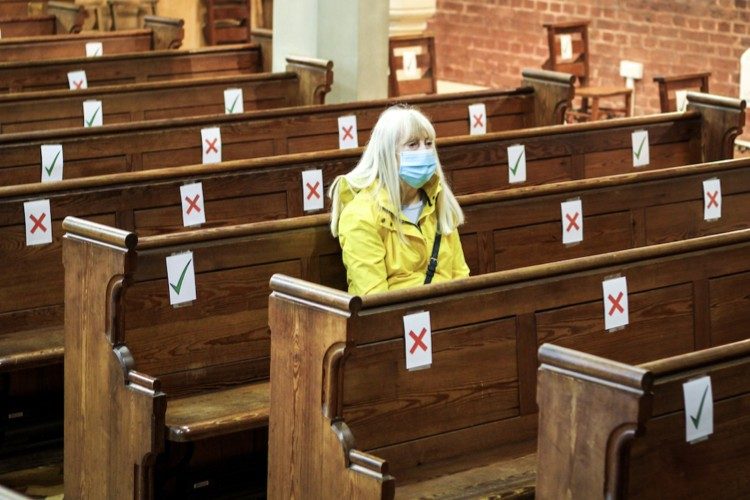
California churches experienced another victory in court this week as the U.S. Supreme Court instructed the Ninth Circuit Court of Appeals to vacate a district ruling against the South Bay United Pentecostal Church in Chula Vista. The Catholic News Agency reports the decision came “in light of recent Supreme Court rulings favorable to churches that have challenged state COVID restrictions that disproportionately limit religious freedom.”
As noted by Christian Post, South Bay’s efforts to challenge the restrictions on in-person church services in the spring were rejected by the high court when Chief Justice John G. Roberts sided with the court’s four liberal judges, but the church amended its complaint this summer and sought to overturn limitations on attendance and prohibitions against singing.
U.S. District Judge Cynthia Bashant sided with the state of California against South Bay on October 15, and the Ninth Circuit upheld that ruling, but the recent Supreme Court ruling in Roman Catholic Diocese of Brooklyn v. Cuomo forced South Bay’s case back to the lower courts for reconsideration.
The Brooklyn Diocese filed suit against the state of New York in October after the state’s COVID restrictions limited indoor religious gatherings in certain areas to just 10 people while allowing other venues to open and operate under less stringent restrictions. The diocese argued in the lawsuit that it had worked with public health officials to establish the necessary safety protocols at indoor masses and had not contributed to any outbreaks. The diocese was joined by Orthodox Jewish congregations in its appeal to the Supreme Court.
The high court ruled against the state of New York on November 25, noting that the COVID restrictions in New York were being discriminatorily applied and granted the diocese injunctive relief, with a full evidentiary hearing scheduled for later this month.
The majority opinion stated that the state’s restrictions violated the First Amendment protection for the free exercise of religion and that the pandemic cannot be used as an excuse to undermine constitutional rights.
“It is time — past time — to make plain that, while the pandemic poses many grave challenges, there is no world in which the Constitution tolerates color-coded executive edicts that reopen liquor stores and bike shops but shutter churches, synagogues and mosques,” Justice Neil Gorsuch wrote in a concurring opinion.
Following the Diocese ruling, the Supreme Court accepted the appeal of California churches against the state’s COVID restrictions in Harvest Rock Church, Inc., et al., Applicants v. Newsom. In that case, Harvest Rock Church argued Governor Gavin Newsom’s rules were discriminatorily applied against churches by prohibiting indoor gatherings for certain businesses and activities, including worship services, but not big-box retailers and warehouses.
“For the governor, COVID-19 restrictions are apparently optional and penalty free. [Newson was caught unmasked at a restaurant with many other unmasked individuals.] But for Churches or anyone worshipping in their own home with someone who does not live there, COVID-19 restrictions are mandatory and enforced via criminal penalties,” lawyers for Harvest Rock wrote in its request to the Supreme Court.
On December 3, a federal judge and Ninth Circuit Court panel sided with California in the Harvest Rock case, but the Supreme Court told the California-based judges to reconsider in light of the ruling in Diocese of Brooklyn v. Cuomo, the Los Angeles Times reported.
This week, a three-judge panel of the Ninth Circuit Court of Appeals vacated Bashant’s October 15 order denying South Bay United Pentecostal Church’s request for a preliminary injunction.
“In light of the Supreme Court’s orders in Harvest Rock Church, Inc. v. Newsom … and Roman Catholic Diocese of Brooklyn v. Cuomo … we vacate the district court’s October 15, 2020, order denying the motion for injunctive relief filed by South Bay United Pentecostal Church (South Bay), and remand to the district court for further consideration of this matter,” the three-judge panel ruled Tuesday.
Thomas More Society Special Counsel Paul Jonna, representing South Bay United Pentecostal Church, celebrated the court’s ruling. “The guidance from the Supreme Court makes it abundantly clear that California’s restrictions on houses of worship are blatantly unconstitutional. We are confident that South Bay will fully vindicate its fundamental constitutional rights in short order,” Jonna asserted.
“He’s the one telling people to change their Thanksgiving plans — yet he himself is gathering privately at an expensive restaurant that many Californians can’t afford,” Republican State Assemblyman James Gallagher told Fox News Wednesday night.
Fortunately, not all of California is discriminating against religious freedoms. Christian Post reports that Los Angeles County, the largest in the state, has exempted churches from its newest stay-at-home order, asserting “faith-based services and protests” are “constitutionally protected rights.”




